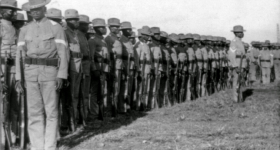Photo Credit: PaKou Her
I have an old, grainy Polaroid picture of my mother taken on the day she became a United States citizen. The edges show the splotchy signs of age, and the dated medium looks like it’s comprised of twenty pixels. In it, my mother sports her signature bun and flashes her million-dollar smile -- proudly displaying a sheet cake, adorned with swirls of sweetness that can only come from one’s local Piggly Wiggly. On the cake is also something else: a huge American flag along with the words, “Congratulations, Youa -- USA Citizen.”
I’ve looked at this photo innumerable times -- the pride glowing in my mother’s face, her citizenship a reward worth every ounce of suffering -- wondering what it must have been like to come of age as a twenty-something US citizen in the tiny, white Wisconsin farming town where my family was sponsored by a benevolent (albeit not entirely worldly), conservative Lutheran church.
Mom endlessly praised the United States, a place where she believed my four older brothers and I could be and do anything: spit-shine our way to unbelievable success, enjoy freedoms unknown to my parents back in Laos, and savour a democracy in which anyone can participate in bettering society. Mom had that same sense of swelling national pride on election days. I can still see her raptly watching the 1984 Regan-Mondale debates on our enormous console TV. On Election Day that year, my mother cast her vote after weeks of helping other Hmong people take part in the election, too. It’s not surprising, then, that I thought of her last November during the Obama-Romney contest, and what her early-80s ballot meant for the Asian Americans whose voices are now growing into a resounding yawp.
According to a poll by the Asian American Legal Defense and Education Fund, we voted overwhelmingly for Obama, throwing 72% of our communities’ support behind the incumbent -- up almost a full 11% from 2008’s exit poll results. While Democrats and Republicans fought over Brown and Black votes, we organized the Yellow vote by running our own door-knocking campaigns and facilitating multilingual election teach-ins, ultimately building cachet as the second most powerful racial demographic group to influence the outcome of the Presidential election.
But the Presidential race was only one electoral ring in which we flexed our Yellow political muscle. In addition to voting overwhelmingly for President Obama, Asian Americans also made an attention-grabbing splash in the House and Senate. We supported Democrats at a rate of 73% in congressional races and participated in electing a slew of noteworthy APIs: Mazie Hirono (HI), Tammy Duckworth (IL_08), Tulsi Gabbard (HI_02) and Grace Meng (NY_06), Ami Bera (CA_07), and Mark Takano (CA_41). We also helped reelect Colleen Hanabusa (HI_01) and Judy Chu (CA_27).
So what does all of this Yellow ballot box influence add up to? What do we get by combining our votes with increased Congressional representation? To me, the math is simple: it all adds up to power. While Asian Americans make up only 3% of the electorate, we’ll continue to be a force to reckon with given that ours was the racial/ethnic demographic group that grew most quickly between 2000-2010. Political mobilization in our communities means we’ll have organized opportunities to raise our collective voice through voting.
But amid the hooting about our heightened political prowess, I caution Asian America to proceed carefully. Despite extolling our historic political strides, we have ample evidence of voter suppression from 2012. Voter ID laws are popping up everywhere, creating immense challenges for the elderly, students, non-English speakers, the poor, and those with limited mobility. The APIs impacted by this kind of voter suppression aren’t nameless, faceless masses; they’re our relatives, friends, and peers.
We must celebrate our wins and fight to gain ground. If we bend to string-pullers intimidated by our growing political power, Mom’s dream of a country where our voices bear the measure of our citizenship will be just that -- a dream. Speak up and call your senator, representative, and governor if you’re opposed to a voter ID law in your state. If you witness voter intimidation, start a petition. If you know our voting rights are threatened, get organized and build a campaign with other Asian Americans. This is the least we can do for each other, and the least we can do to breathe life into one refugee woman’s vision, born on the day she sat in a church basement, smiling brilliantly before a Polaroid camera.
PaKou Her is a second generation API of Hmong descent. She is an antiracism organizer/trainer and still dreams of one day pursuing a long-lost singing career.









Comments